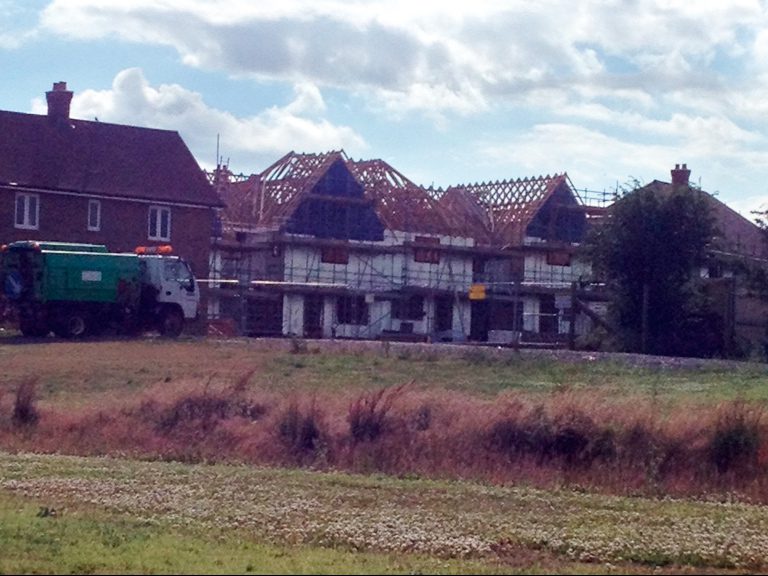A recent report from two Rother district councillors to their Northiam constituents highlights the concern that affordable homes are being sacrificed in the drive to build new homes. This concern is shared by other influential organisations such as the Campaign for the Protection of Rural England and English Rural
Over two thirds of rural communities in England may not be able to secure any new affordable houses in the future, a coalition of organisations, led by Action with Communities in Rural England (ACRE) has warned.
We are deeply concerned that the government is looking to water down
requirements to provide affordable housing – a change that will disproportionately disadvantage many living in the countryside.
For many years, affordable homes could be built in rural communities using two planning policies – as a requirement on open market developments and rural exception sites. However, these mechanisms could be lost because of changes proposed to the current planning system. Such a move would be catastrophic for smaller villages where property prices are already well beyond the reach of many households.
The change is in contradiction of the prime minister’s pledge to “give the people of this country the homes we need in the places we want to live, at prices we can afford” as expressed in the planning white paper.
Watering down existing policies
ACRE’s chair, David Emerson CBE said: “We are deeply concerned the government is looking to water down requirements to provide affordable housing – a change that will disproportionately disadvantage many living in the countryside.
“For communities already struggling to retain the employees and owners of local businesses this is a body blow, quite apart from its impact on the customers and providers of local services and the volunteers who provide the social support for vulnerable residents”.
Rural communities in England already suffer a chronic and acute shortage of affordable homes to buy and rent. Someone living in the countryside on low earnings needs to spend nine times their income to buy a home in the lower end of the market – and only 8% of the housing stock is social housing, compared with 19% in urban areas.
And last year, fewer than 6,000 new affordable homes were built in smaller rural communities – equivalent to less than one new affordable home in each village.
Changes will hit villages hard
The government is proposing to quadruple the size of residential sites that will require affordable housing. If this change is made, no new affordable homes will be provided on sites of fewer than 40 dwellings. Most residential sites in smaller rural communities are for 10 houses or fewer. There is a limited rural exemption from this change, but it will not apply in almost 70% of smaller villages.
Equally harmful is the introduction of First Homes Exception Sites which will cause confusion, inflate land values and destroy the emphasis on local engagement. No longer will communities benefit from the existing rural exception site policy which provides a mix of affordable homes tailored to specific housing needs and design requirements of the local community.
ACRE, the Rural Housing Alliance, Rural Services Network and Plunkett Foundation have written to the secretary of state calling for rural communities with a population of 3,000 or fewer to be exempt from the new rules, with local councils able to set their own thresholds for affordable housing in these settlements.
The organisations claim that without these revisions – and just when the PM is pledging to make it easier for people to secure homes they can afford – the government will fail to deliver on its agenda to “Level Up” and secure a sustainable and vibrant future for the countryside.
Image Credits: Rye News library .




These two Rother District Councillors have done a great job in the circumstances. I don’t live in Rother District, but I would like it if they represented me.
I wonder how many of your readers knew of and read the Government’s White Paper which requested comments on its proposals. I wonder who the Government wanted comments from. I wonder how many people actually knew that they could comment on its proposals. I wonder how many knew when the deadline for comments to be submitted was.
The opportunity to comment and raise objections at the White Paper stage has gone.
I was made aware of the White Paper and the deadline through a pressure group. The Government had not advertised it widely. It may have been an item in the news. I was not ware of it.
The White Paper was something like 78 pages long. The first 1-3 chapters were clear and invited positive answers to general questions about proposals that sounded inviting and sensible. In the following pages the meat of the proposals was set out in language that was more dense. I had to pick apart sentences to get at the meaning. Given 24 hours notice of it, I couldn’t have read the whole thing. In all honesty I wouldn’t have had the time, concentration, or will to read it all.
The Government should have advertised this White Paper widely. It should have made proposals clear. It is wrong and cynical to write questions that invite the answer ‘Yes’ to general proposals, before giving the details of what those proposals will mean.
I wanted to read at least some details describing how these proposals would be implemented. I read and skimmed through the first 25 odd pages. From what I read, I had understood the proposals in the White Paper according to the report above. Thank you for clearly stating the details. What action can we take now?